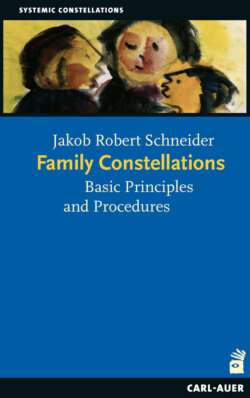Читать книгу Family Constellations - Jakob R Schneider - Страница 5
На сайте Литреса книга снята с продажи.
Foreword
ОглавлениеThis book does not actually need a foreword, nor does it need any words of invitation, preparation, or explanation. It speaks entirely for itself. Originally, the book was planned as a compact introduction to family constellation work and was to be part of a new series of introductions to various systemic approaches and related topics. The task of streamlining shortening a manuscript makes it pithier, more lively and forceful. As we read Jakob Schneider’s first draft, however, it was clear that it was already so clear and compact that it would be a pity to cut it shorter, so we encouraged him to do the opposite and expand the text.
The result is a completely up-to-date, basic introduction to family constellations that is well structured, concise, and supported by many clear and often touching case examples. It summarises the development, basic principles, focus, attitude, and procedures of constellations and it does so in a way that is always logical, differentiated, and stimulating. To round it off, there are a few basic theoretical considerations.
All of the insights, concepts, principles, and basics that were initially developed by Bert Hellinger (conscience, soul, orders of love and helping, dynamics of bonds and entanglements, and resolution), are included here in brief, in a form that is easy to understand. I know of no book that describes the broad scope of family constellations in such a clear, compact, yet comprehensive way. This book does not preach, it does not seduce, and it does not immobilise. Rather, it invites readers to form their own ideas about family constellations and to draw their own conclusions. In the author’s style and expression, readers already have a taste of the attitude that underlies all family constellation work: collected awareness, a respectful orientation towards resources and resolutions, and extreme reserve in setting intentions or goals.
Jakob Schneider has been friends with Bert Hellinger for many years and is the only therapist who has continued long-term to offer constellation work the way Bert Hellinger developed it. Because of his non-dogmatic, non-prescriptive, neutral stance, readers are not tempted to react to the ideas defensively as has happened (at least to me) with other books on family constellations. Although Jakob Schneider remains very close to Bert Hellinger’s conceptualisation, this book is very much his own. Constellation work has been at the centre of his work and that of his wife, Sieglinde, for a very long time, and his intensive confrontation with the work through twenty years of experience is clearly visible. The work is clearly embodied in him in his flesh and blood (or, perhaps the work is individually “tailored” to him, in keeping with his name, Schneider, the German word for tailor). Since he often works abroad, the book opens a wide horizon that often goes far beyond the usual boundaries of counselling and psychotherapy in a sensitive way that I find satisfying and not artificially elevated.
Just as Paul Watzlawick was able to present Gregory Bateson’s ideas to readers in an attractive and accessible way, this book could help to raise awareness of Bert Hellinger’s insights and of family constellation work, a work whose deep and unique effects continue to move and amaze me.
The book has something to offer everyone who is already working with constellations, but also those who are interested in gaining an overview of this work.
Gunthard Weber Wiesloch, February 2007
